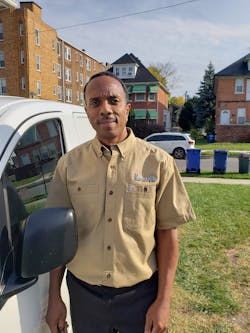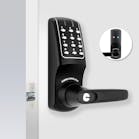
March 2020 was an earth-shattering month in the United States with the seemingly sudden emergence of the COVID-19 pandemic. Much of the economy quickly shut down; people huddled in their homes; and each state dictated which businesses could stay open, be reduced or had to close.
It didn’t take long to understand that those of us in the “security” industry were labeled “essential services” and could continue to be open and working. A slew of rules and regulations had to be followed for safety reasons, such as distance between people, good hygiene including washing hands and, eventually, the wearing of masks.
Many industries were shaken, and quite a few continue to stumble. Restaurants, airlines, entertainment and hotels are some of the industries most affected, but COVID-19 challenged so many companies, including those that sent employees home to work virtually.
SHDA distributors, thankfully, were able to stay open but still were hit hard. Even though security products were considered essential, many distributors and their locksmith customers suffered because of companies reducing staff or sending employees home to work. Others closed, finding it too difficult to weather the reduced business.
It’s been more than a year since the beginning of the pandemic, and many locksmiths eventually found their footing, even though quite a few suffered losses and much lower sales. I’ve heard from locksmiths who closed their businesses for a while that sales dropped 50%–80% in April and May 2020 but steadily improved afterward. Many said closings of schools, office buildings and restaurants made it difficult to do “business as usual.”
Moving Forward
Locksmiths, challenged as never before, had to find new ways to make it through. One of those who did is Kelvin Heath, owner of Praiseworthy Door, Lock & Key, a mobile locksmith business in Detroit. Heath started locksmithing in 1993 after he took Foley-Belsaw classes. For 27 years, he did locksmithing on the side while he worked at Church’s Lumberyard, Johnson Controls and various nonprofit groups. In the past three years, however, he worked full time in locksmithing with his son. Much of Heath’s business is residential, aimed at homeowners and real-estate investors who turned to him to rekey houses.
When COVID struck, Heath used his down time to organize his business, including his work truck. He spent a lot of time on Zoom, taking online classes on various subjects, such as safe-opening, automotive and doors. He taught himself door installation and locksmithing tips from YouTube.
Heath called customers and told them he was still in business and ready to service them and made sure he was on ALOA’s Find a Locksmith website. He reached out to nonprofits and others he met and told them that he was ready for their business. He tried to maintain a positive attitude, always ready to network and eager to reach out to others. He also made sure to focus on his health by taking vitamins and enjoying a daily health smoothie. He understood that you can’t keep a small business going if you don’t stay healthy enough to work.
“The key to my success is putting God first and giving to God my tithes and offering consistently,” he says.
Tom Lewis, owner of The Town Locksmith of Plymouth, Michigan, says COVID “killed business from mid-March to the end of May.
“It allowed us to file for federal assistance from the SBA [Small Business Administration]. We were able to pay our employees, so we didn’t have to lay anyone off,” he says. “It allowed for time to regroup and take stock into everything we do, re-evaluate how we do business and make sure we were able to get paid more quickly after jobs were completed.”
Lewis also says, “We were able to check out some newer and emerging technologies and how they work into our playing field. Overall, I think it helped slow us down and appreciate what we have and how to keep it, for the long haul — especially our employees and how they looked at the business.”
Hanging in There
Jan Crawford from Westland Lock and Key says the pandemic struck when she already was going through great changes in her business. One of her best technicians had died three years earlier, and then she bought out another locksmith, hiring him in 2019, primarily for his automotive expertise. Tragically, in March 2020, he died suddenly after her inside salesperson retired. In desperation, Crawford was forced to hire a new tech who had no locksmithing experience.
When the pandemic struck, Crawford changed her hours to 12-5 p.m., because many of her commercial customers closed their buildings and had their employees go remote. From March to June 2020, she furloughed her new employee and worked solo outside. Still, through all of these struggles, Crawford persevered, saying her faith helped her to survive these devastating challenges.
Crawford says she went through a tough period in 2007–2009, but nothing was as difficult as the challenge of 2020. Yet, she took advantage of this time, learning via many Zoom webinars, mastering the Smart Pro and reaching out to mentors.
“Thank Goodness for Zoom,” she says. Zoom helped her to learn and communicate with others, and even though she didn’t do much online business, she communicated to her customers online. She also followed all the COVID protocols, wore masks, took temperatures and had to use extra due diligence, which “sharpened and honed us.”
Crawford wasn’t afraid to reach out to get help from a network of friends and mentors, including her accountant, bookkeeper, financial planner and lawyer. With their help, she applied for and received the PPP, which covered her and her part-time employee. But she didn’t stop there, reaching out to get an SBA loan, which helped to keep her in business. Crawford simply wasn’t going to let the challenges of COVID end a business that was more than 50 years old.
Even now, Crawford keeps reaching out for all the help she can get, applying for the new PPP and a State of Michigan grant. She admits that she never received help from the government before 2020 but is glad she did. This experience has helped her to be cautious, but now, she is hoping that business will stabilize and return to normal at some point.
Still, Crawford admits that blessings accompanied her troubles. Her experience allowed her to get “smarter and tougher” through all the trials of the past year, valuable lessons in her personal and business life. At the same time, she realized the importance of staying healthy and exercising, even when gyms were closed, and the necessity to keep her mind sharp and focused.
Looking Ahead
The past year has been difficult and for many, traumatic. We all learned to live and to do business differently from before. COVID accelerated big changes in the economy, changes that might stay in place long after the pandemic recedes. So many small companies, including distributors and locksmiths, have had to recalibrate their businesses, and those changes might last for years to come. No one can take business for granted anymore. Too many retail customers and companies have gone online to purchase and do business, understanding that online is simple, practical and convenient.
Locksmiths shouldn’t assume that things will “get back to normal” when the threat of COVID has diminished. They must stay positive and aggressive, reach out to old customers and look to find new customers. It’s also important to realize that your health and the health of your customers are critical while changes are ongoing, COVID or not.
It’s even more important for locksmiths to learn to navigate the online world, although it still is possible to do business the old-fashioned way as long as you use every tool you have and stay focused on servicing your customers as well as you can.
There always will be a demand for security professionals, and if you hustle and network and keep attuned to the latest information, you can make it. Let Kelvin Heath, Tom Lewis and Jan Crawford be illustrations of surviving during stressful times. Their examples of how to prosper can be lessons for locksmiths everywhere: Stay positive, serve your customers every day, keep on the lookout for new customers, learn as much as you can about your craft and never give up.
Arnie Goldman is president of IDN Hardware Sales, a Division of IDN Global and a Security Hardware Distributors Association (SHDA) distributor. Learn more about SHDA at www.shda.org.





